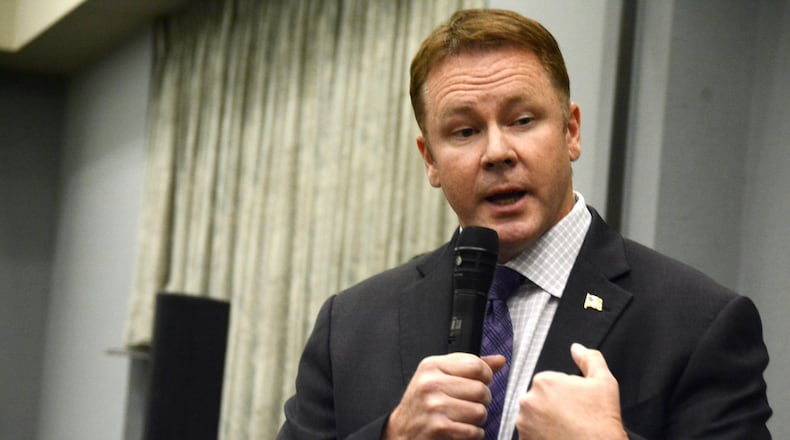The technology aims to replace ledgers maintained by central authorities such as banks.
The assets were frequently used initially for illegal purposes, with the website “Silk Road” becoming famous for using the digital assets for the sale of drugs. But now a part of the general financial world — Facebook this week announce it was launching its own cryptocurrency — and Davidson is seeking to craft the U.S. regulations so that someone is accountable for the system, much as banks are held accountable during traditional financial transactions.
Without clearer regulations, Davidson said, the United States is losing out on the capital and resources the technology is making available. Davidson is a member of the House Financial Services Committee.
The capital, he said, “is not going offshore to places where there are no laws. It’s going offshore to places where they pass laws that provide certainty that if I put my capital here, I know the framework under which I’m going to be operating… we have all the innovations, we have the largest markets, we have these phenomenal capital markets and we’re driving that capital out of our country.”
Davidson said there is no real legal definition for cryptocurrencies in the U.S. and said that creating one will help the economy and be good for Ohio.
The lack of clarity leaves the system vulnerable, and the lack of regulation has been frustrating enough to some that some companies have chosen to do their innovation here, but move their capital overseas, to countries such as Singapore, Switzerland and Malta, which all offer regulatory guidance to those in the industry.
There are some rules already in place; IRS regulations consider cryptocurrencies to be property, and owners are subject to capital gains taxes if they sell currencies which gained value while they owned them.
Davidson said a light-touch update to U.S. financial laws is needed to give companies and entrepreneurs the certainty they need to focus on innovating and creating jobs. To him, the technology has limitless potential; it could be used for everything from music to jet engines to home loans to advertising.
Davidson has introduced a bill that would define when a cryptocurrency is a security.
His bill, he said, creates a “bright line test” to determine what is and what isn’t a security within cryptocurrency and who are the proper regulators for each product. Some products, he said, might be better regulated as a commodity or a good or service. His bill aims to remove confusion over who is the proper regulator for each type of cryptocurrency and what regulations the company must comply by.
“Having something out there is important,” said Jonathan Dever, an attorney and former Ohio representative who works on the issue. “Because otherwise we’re in the Wild West.”
Cryptocurrency could still be open to abuse, Davidson said, the the benefit is that cryptocurrency offers protections that cash does not.
“When you steal cash, it’s hard to find where the cash went,” he said. “But when you have a distributed ledger, you can’t move A to B to C without having a ledger. You can follow all the money….the good actors are the ones asking for a legal framework.”
Davidson’s bill has bipartisan support with an equal number of Republican and Democratic cosponsors.
Rep. Steve Stivers, R-Upper Arlington, said the new industry creates confusion because it’s frequently unclear whether certain products are a currency, a security or commodity.
“There are a bunch of different folks that could look at it,” he said. “And Warren’s point — which I agree with — is people need to know whether something is a security, a commodity or a currency.”
For Davidson, the bill is offers an opportunity to be at the forefront of a new way of doing business.
“To me, it’s like the early days of the Internet,” he said. “A lot of people knew it would be big, some people didn’t quite get it. You’re going to see similar trial and error stuff to launch digital assets. What we need is legal framework to make it clear that if you’re launching these digital assets, we want you to do that innovation in America.”
Kristin Smith of the Blockchain Association, a trade association representing the industry, agrees with Davidson that there are parallels between the advent of the Internet and the birth of cryptocurrency.
The association is an “enthusiastic” supporter of Davidson’s bill.
“There’s a lot of fundamental work that we think needs to be done in terms of regulation that is responsive to the unique considerations of open blockchain technology,” she said, adding that the goal is to craft regulations that “let the good guys know they’re protected, the consumer know they’re protected” and that encourage industries to continue to do business in the United States.
Davidson’s bill is “a start,” she said. “But it’s a really good start.”
About the Author
